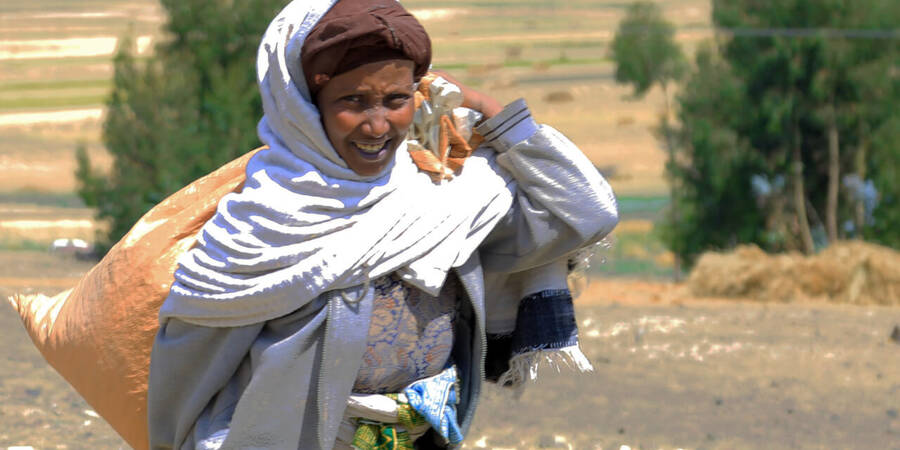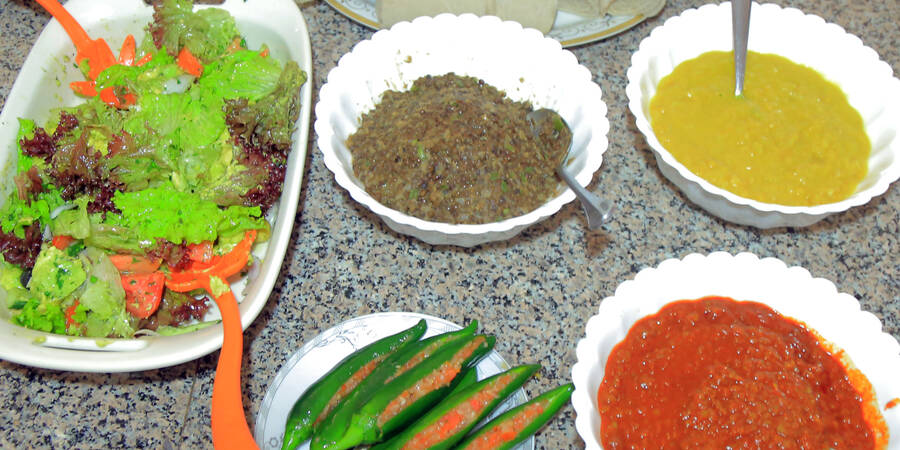Lentil commercialization in Ethiopia through the lens of gender equity

The commercialization of cash crops has long been hailed as a pathway to economic development and improved livelihoods in low- and middle-income countries but is known not to benefit women and men equally. A new study funded by CGIAR's Sustainable Intensification of Mixed Farming Initiative examines why understanding gender norms, relations, and equity dynamics is critical to ensure that crop commercialization helps to close, not widen, the gender gap.
Can crops that are commercialized truly be gender inclusive?
The gendered categorization of crops has long shaped agricultural norms and relations in many resource-poor rural economies. Men farmers in these communities tasked with generating income focus on “men’s crops” – cash crops that bring high yields and have market qualities and, as a result, have priority access to the best seeds, soil, inputs, labor, and machinery on the farm. “Women’s crops,” on the other hand, are often considered subsistence crops, cultivated mainly for home and considered secondary. This results in women cultivating them in marginal soils with little or no access to inputs and being tasked with the intensive labor needed to ensure their healthy growth, such as weeding. Whilst the reality is more complex – for example, women may contribute to the labor of “men’s crops,” especially as prices rise – what is critical is that these gendered differences are addressed when a “women’s crop” undergoes extensive commercialization, so women do not miss out.
The case of lentils in Ethiopia
In Ethiopia's Amhara and Oromia regions, lentils are on a clear trajectory for being more of a cash crop than a subsistence crop, local farmers perceive that as a pathway to economic development and improved livelihoods. While this has increased demand and prices for lentils, a new study reveals that some women have become marginalized from its development despite traditionally being considered a “women’s crop.”
“Once men become interested in the cash potential of a crop, gender inequities regarding its cultivation and use can change” - Jemima Baada, Assistant Professor at the University of British Columbia (UBC) and a co-author of the paper.------------------------------------------------------------------

The study emphasizes how gender norms are woven like invisible threads into the fabric of resource allocations. Household and farm labor roles, dictated by societal expectations of women as nurturing caregivers and homemakers, serve as barriers to their full participation in agriculture, constraining their involvement in collective activities and hindering their access to the credit, information, and technologies essential for successful commercialization.
Change and Continuity in Lentil Commercialization
A mix of 24 focus groups and 214 interviews reveals differences in how farmers perceive the benefits of lentil commercialization. Some farmers, including men and women, called the increase in demand and prices a “lifeline,” while others commented that the price rise means household consumption has dropped. As one male respondent commented, “Household consumption depends on … economic class, rich- and middle-class people consume more lentils, the poor lentil farmers sell it.” A married woman farmer made a similar point.
“Now lentil has become a cash crop, we use very little for household consumption. Women in earlier times had full rights to lentils. Now women have no rights at all.”

Social status also affects access to benefits from crop commercialization. Unmarried women and farmers of low socio-economic status, including some men, may lose out to married women who can access their husband’s resources, including inputs, labor, and access to markets.
Policy Recommendations
The authors propose two recommendations to promote equitable gender benefits from lentil commercialization in Ethiopia.
-
Challenging and transforming gender norms that restrict women's access to resources and opportunities in agriculture. This can be achieved through targeted interventions promoting women's empowerment, such as training, credit, and technology support.
-
Addressing the exclusionary effects of labor commercialization by ensuring that vulnerable groups, including farmers of low socioeconomic status and unmarried women, are not left behind. This could involve implementing social protection programs and promoting inclusive labor practices.
The study shows that by understanding the complex interplay of gender norms, relations, and commercialization, policymakers, and stakeholders can design interventions that empower women and ensure their meaningful participation in the market-oriented production of cash crops. ICARDA is engaged in the same community to challenge norms around women’s participation in income-generating opportunities under SAPLING and SI Initiatives.
--------------
Read the full paper: Can a cash crop be a women’s crop?: Examining gender norms, relations and equity around lentil commercialization in Ethiopia | ICARDA
Authors:
-
Dr. Dina Najjar, Senior Gender Scientist, Sustainable Intensification and Resilient Production Systems Program, ICARDA
-
Dr. Jemima Nomunume Baada, Assistant Professor, Department of Geography, UBC, Canada
-
Mahelet Hailemariam Seifu, Independent Consultant, Adis Ababa, Ethiopia



